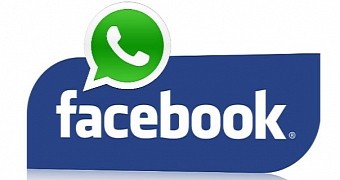Facebook didn’t pay $19 billion (€15.02 billion) for WhatsApp, but rather $22 billion (€17.38 billion), according to the latest numbers following the closing of the deal on Monday.
The additional $3 billion (€2.37 billion) comes from the heightened valuation of Facebook’s stock, which has gone up in recent months. Back on February 20, Facebook’s stock was at $69.63 (€55.05), but the number has now climbed to $77.56 (€61.32), as per yesterday’s quote.
The original agreement saw WhatsApp receiving $16 billion (€12.65 billion), plus an additional $3 billion (€2.37 billion) in Facebook stock options for the company’s execs and employees. Facebook paid $4.59 billion (€3.62 billion) in cash and 178 million shares of its stock for WhatsApp. An extra 46 million of grants in restricted units that will vest over a four-year period are going to WhatsApp employees. Calculated at Monday’s share price, the deal is now closer to $21.8 billion (€17.23 billion) than the original $19 billion (€15.02 billion).
Jan Koum gets $2 billion in stock, $1 yearly salary
WhatsApp founder Jan Koum will receive 24.9 million Facebook restricted stock units which will vest over a four-year period, worth about $2 billion (€1.58 billion), as an incentive for him to stick around with the company, a common practice among companies that acquire other startups.
He will also serve as the Chief Executive of the company and become a Facebook director with a $1 annual salary, just as Mark Zuckerberg, Facebook CEO and co-founder. He will also not be eligible and will not receive any additional compensation as a member of the Board and will not serve on any committees of the Board.
WhatsApp has grown quite a bit over the past few months. It now has more than 600 million monthly users and it will continue at a similar pace in the coming period thanks to its popularity among younger mobile users.
The closing of the deal comes after the European Union also gave its permission for the purchase, something that American authorities did a while back.
“The Commission found that Facebook Messenger and WhatsApp are not close competitors and that consumers would continue to have a wide choice of alternative consumer communications apps after the transaction. Although consumer communications apps are characterized by network effects, the investigation showed that the merged entity would continue to face sufficient competition after the merger,” the document reads, explaining the Commission’s position towards the acquisition.
The European authority believes that there’s a big difference between Facebook Messenger and WhatsApp, which makes it OK for the social network to purchase the app making company.

 14 DAY TRIAL //
14 DAY TRIAL //